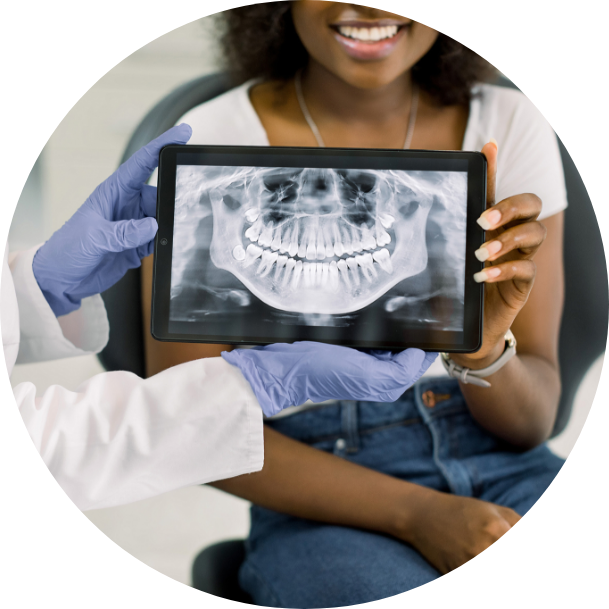
Wisdom teeth
If you need dental care for your child’s wisdom teeth in the Twin Cities, greater Minnesota and western Wisconsin, look no further than Park Dental. All our doctor-owned, locally loved practices offer wisdom teeth services.
What are wisdom teeth?
Wisdom teeth are also known as your third molars. These molars are the last adult teeth to come in, and they typically develop between ages 17 and 24. They are known as wisdom teeth because they come through when you are at a more mature (or “wise”) age.
Some people develop perfectly healthy wisdom teeth, while others have no wisdom teeth. Wisdom teeth can cause dental issues, such as:
What are wisdom teeth?
- Crowding or damaging nearby teeth
- Difficulty flossing between the wisdom teeth and nearby teeth
- Gum disease
- Infection
- Tooth decay
For this reason, your or your child’s dentist may recommend wisdom teeth removal.
Impacted wisdom teeth
When a wisdom tooth comes in, it can get impacted. This means that it remains stuck in the gums or bone. Typically, wisdom tooth impaction happens because there isn’t enough room for the tooth to grow. Impaction can cause infection, an abscess and misalignment of teeth in the rest of your teeth.
Not everyone experiences symptoms when their wisdom teeth become impacted. However, an impacted tooth that becomes infected can lead to pain or swelling of the gums. Other symptoms of impacted wisdom teeth include:
Impacted wisdom teeth
- Bad breath
- Difficulty opening the mouth
- Gap where the tooth didn’t emerge
- Headache
- Jaw pain
- Pain or tenderness of the gums
- Redness and swelling of the gums
- Swollen lymph nodes in the neck
- Unpleasant taste in the mouth
Wisdom tooth removal
When wisdom teeth start coming in, Park Dental’s general dentists can help you determine if they need to be removed. Before deciding whether to move forward with the procedure, your dentist will take X-rays and examine the wisdom teeth and discuss the pros and cons.
A dentist might encourage wisdom teeth removal for the following reasons:
- The teeth may be blocked from coming in.
- The teeth are impacted or partially erupted.
- The teeth are damaged or decayed and pose a future risk of damage or decay.
If the dentist decides the wisdom teeth don’t need to be removed, he or she will recommend regular dental checkups to monitor tooth eruption and care. As you or your child gets older, you may face problems with your wisdom teeth and need them removed later in life.

What to Expect During Wisdom Tooth Removal
Wisdom tooth extraction is typically performed by a dentist or oral surgeon. The procedure requires local or general anesthesia.
During a simple extraction, the dentist or oral surgeon may only need to loosen the tooth and remove it with forceps. For a more complex procedure to address impaction or other complications, the dentist or oral surgeon may need to cut a flap of gum and remove some bone surrounding the tooth.
What to Expect During Wisdom Tooth Removal
The dentist or oral surgeon may then be able to extract the tooth with forceps, or if it is still too difficult to remove, by sectioning it into smaller pieces.
After the tooth is removed, the dentist or oral surgeon will clean the gum socket, smooth the bone and close the gum with stitches. Patients will likely need to bite down on gauze to help stop any bleeding for at least 30 minutes afterward.
Dry Socket
The holes in the gums where the wisdom teeth once were will develop a blood clot. It’s extremely important that this blood clot stays in place to promote healing and prevent dry socket.
Dry socket exposes the bone and nerve to air. It’s a painful condition that interferes with healing. Symptoms of dry socket include:
- Bad breath
- Bad taste in your mouth
- Fever
- Pain that radiates to your ear, eye, temple, or neck
- Severe pain
To keep from developing dry socket, follow the dentist’s or oral surgeon’s instructions for at-home care.

Aftercare Advice
After your surgery, you will receive specific instructions and possibly prescription medications. Be sure to follow these instructions to prevent dry socket and promote faster healing. Keep in mind that some swelling, bruising and pain are normal. However, if swelling or pain is severe, contact your dentist.
You can also follow these tips to promote healing:
- Apply ice packs to the cheek in 15-minute increments to help with pain and swelling
- Avoid drinking from a straw or any bottle that requires a sucking action
- Avoid forceful spitting
- Don’t drink alcohol
- Don’t rinse vigorously
- Don’t smoke
- Eat soft foods, such as yogurt, soup and mashed potatoes
Aftercare Advice
- Limit strenuous activity for at least 24 hours after surgery
- Start gentle mouth rinses with warm salt water after your procedure, as recommended by your dentist
- Rinse twice a day and after meals.
- Take any medications prescribed by your dentist or oral surgeon.
Request an appointment with a family dentist you can trust at a Park Dental location near you.